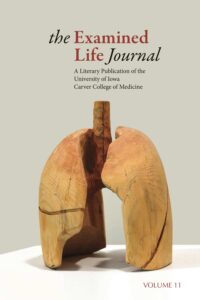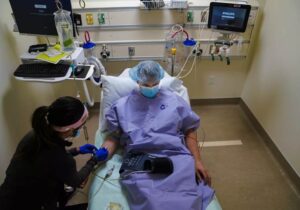Listening is one of three skills necessary to great communication. When doctors listen, patients feel heard and seen as more than a medical diagnosis. When doctors listen, patients are engaged which can positively influence medical treatment, compliance, and even outcomes.¹ Therefore, how physicians interact with patients is critical.
Three skills form the basis for great communication – showing empathy, effective listening, and building trust. Each of these skills, however, begin with specific actions and behaviors. Joseph’s patient experience highlights how the actions and behaviors taken by his physicians led to better outcomes.
Joseph’s Diagnosis
Joseph has Sarcoidosis, an auto-immune disease that produces small lumps that affect organs in the body. I had the privilege of meeting Joseph as part of a series of interviews I’ve conducted with people experiencing serious illness. The intent of these interviews, to understand the role of advocacy and support during times of illness.
Eight years prior to his diagnosis, Joseph received treatment for Rheumatoid Arthritis. Apparently it is common to mistake sarcoidosis for other diseases. Throughout treatment, his Rheumatologist kept telling Joseph, “…there’s something about you and your case that is just, doesn’t quite sit right with me.”
In some patients, sarcoidosis can just spontaneously disappear. For others, as with Joseph, the disease is chronic requiring ongoing care and treatment. There is no cure.
Given the advanced stage of his disease, Joseph currently has a team of many different specialists (Neurologist, Pulmonologist, and Retina Specialist to name a few.) This team of experts listen and help to manage the many side effects associated with Joseph’s disease.
Building Trust
During our conversation, Joseph shared how he began to trust his medical team.
The neurologist on Joseph’s team is the physician that correctly diagnosed the Sarcoidosis. This doctor sent the initial test results to a multi-disciplinary Board at another hospital to review and confirm. The act of bringing in additional expertise was not seen as a sign of weakness. Rather, seeking additional input bolstered Joseph’s confidence. It was the willingness of this physician to admit there may be things he did not know. To Joseph, this was the foundational stepping stone toward building trust.
Additional Behaviors and Actions for Improving Communication
Communication as a Two-Way Exchange
Joseph described the communication style of his physicians as more of a dialogue, a give and take, rather than authoritative or paternalistic. He wouldn’t have it any other way. “I would question my providers with critical questions, research questions, pros and cons.” Joseph’s medical team were receptive to questions, rather than hostile to this approach.
Patient as Credible
Furthermore, when Joseph’s doctors listened, he felt they believed him. Joseph was able to share what was going on with his disease and doctors used this information to guide care and treatment.
All of my doctors, and I’ve got a lot of them. They’re all listening. They’re like, ‘you’re living it.’ When the symptoms that start off that are mild, and I tell them this is what’s going on, they don’t wait to say, ‘let’s see what happens’, they’re like, ‘if you feel it, we believe it, get into the hospital.’ Right? And so, so I really do feel that I’m in control of my care.
When doctors listen, the act of listening, viewing the patient as credible, are steps toward improving communication. As a result, the patient feels empowered. And this feeling of empowerment can make a positive difference in treatment and in healing.
Coordinating Care
All members of Joseph’s medical team took on the the responsibility of coordinating care.
…during the height of my illness, they were all really connected. They had to be, because if one prescribed x, another prescribed y, that could send me over quick. Because I was just so fragile, [to] what was going, to what could possibly upset my biology that no one was willing to take that risk…I think that’s why I’m here, in the state that I’m in, because of that coordination.
Given the many specialists involved with providing care for Joseph, communication and coordinating care were essential. Too often, patients are responsible for coordinating care and making sure communication between team members happens. As a patient, this is a difficult burden to carry, particularly when someone may be seriously ill.
Benefits to Improving Communication Between Physicians and Patients
During Joseph’s research into his illness, he learned that the likelihood of living with a high level of functionality is rare. He credits his medical team, the way they communicate and work with him, to being where he is now. Joseph is very much alive, engaged, and is blessed with a high level of functionality.
The neurologist calls Joseph his ‘miracle patient.’ As he notes, “Any other patient that would have come in with [your] symptoms, by this stage, they would be in a wheelchair…the attack on your spine, it just pulls you down, and most people don’t recover…the fact that you’re up and mobile, I look at you and I just shake my head.”
How physicians and patients communicate and interact with each other is critical. When doctors listen, show empathy, and build trust – these skills can make a difference in the quality of care delivered and ultimately the healthcare outcomes.
* Quotes in this post are from interviews conducted for my book, Navigating Illness: The Patient Experience, a work in progress. Names were changed upon an individual’s request.
¹Khan,A., et al. (2018). Patient safety after implementation of a coproduced family center communication programme: multicenter before and after intervention study. British Medical Journal. http://dx.doi.org/10.1136/bmj.k4764.



